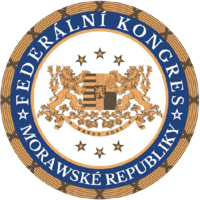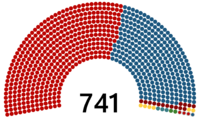Federal Congress (Morrawia)
This article is incomplete because it is pending further input from participants, or it is a work-in-progress by one author. Please comment on this article's talk page to share your input, comments and questions. Note: To contribute to this article, you may need to seek help from the author(s) of this page. |
Federal Congress of Morrawia Morawský federální kongres | |
|---|---|
| 48th Federal Congress | |
 Official seal of the Federal Congress of Morrawia | |
 Official logo of the Federal Congress of Morrawia | |
| Type | |
| Type | |
| Houses | Senate of the Republic House of Representative |
| History | |
| Founded | March 1, 1836 |
| Preceded by | National Assembly |
New session started | March 8, 2024 |
| Leadership | |
President of the Senate | |
President pro tempore | |
Senate Majority Leader | |
Speaker of the House | |
House Majority Leader | |
| Structure | |
| Seats | 140 (Senate of the Republic) 741 (House of Representatives) |
 | |
Political groups | Majority (71)
Minority (69)
|
 | |
Political groups | Majority (428)
Minority (313)
|
| Committees |
|
| Committees |
|
Joint committees |
|
Length of term | 4 years (House) and 6 years (Senate) |
| Authority | Legislative |
| Salary | ₮457,440 (ACU 114,360) |
| Elections | |
| Single Transferable Vote (Senate) | |
| Instant-runoff (House) | |
First election | March 3rd, 1836 (founding) |
First election | March 3rd, 1842 (all congressional seats filled) |
Last election | March 7th, 2024 (Senate) |
Last election | March 7th, 2024 (House) |
Next election | March 9th, 2026 (Senate) |
Next election | March 9th, 2028 (House) |
| Meeting place | |
 | |
| Capitol Building Republic of Morrawia | |
| Website | |
| federalcongress | |
| Constitution | |
| Morrawian Constitution, article II | |
The Federal Congress, or simply Congress, is the legislature of the federal government of the Republic of Morrawia. It is bicameral, composed of a lower body, the Morrawian House of Representatives, and an upper body, the Morrawian Senate of the Republic. It meets in the Capitol Building in Králowec, F.D. Morrawian Senators and Morrawian Representatives are chosen through direct election, though vacancies in the Senate may be filled by a governor's appointment. Federal Congress has 881 voting members: 140 senators and 741 representatives. The Morrawian vice president, as President of the Senate, has a vote in the Senate only when casting a tie-breaking vote. The House of Representatives has one non-voting member.
Federal Congress convenes for a four-year term, commencing in March. Elections are held every even-numbered year on Election Days. The members of the House of Representatives are elected for the four-year term of a Federal. The Reapportionment Act of 1995 established that there be 741 representatives, and the Uniform Congressional Redistricting Act requires that they be elected from single-member constituencies or districts. It is also required that the congressional districts be apportioned among states by population every ten years using the Morrawian census results, provided that each state has at least one congressional representative. Each senator is elected at-large in their state for a six-year term, with terms staggered, so every two years approximately one-third of the Senate is up for election. Each state, regardless of population or size, has seven senators, so currently, there are 140 senators for the 20 states.
Article Two of the Morrawian Constitution requires that members of the Federal Congress must be at least 18 years old for the House and at least 30 years old for the Senate of the Republic, be a citizen of the Morrawia for five years for the House and nine years for the Senate, and be an inhabitant of the state which they represent. Members in both chambers may stand for re-election an unlimited number of times, though they are limited by the national retirement age as per relevant legislation.
The Federal Congress was created by the Morrawian Constitution and first met in 1836, replacing the National Assembly in its legislative function. Although not legally mandated, in practice since the 19th century, Federal Congress members are typically affiliated with one of the two major parties, in contemporary period, that is the Liberal Party or the Republican Party, and and in fewer cases with third or other party or independents affiliated with no party. In the case of the latter, the lack of affiliation with a political party does not mean that such members are unable to caucus with members of the political parties. Members can also switch parties at any time, although this is quite uncommon.